Callum Rhys Tilbury
Putting Data at the Centre of Offline Multi-Agent Reinforcement Learning
Sep 18, 2024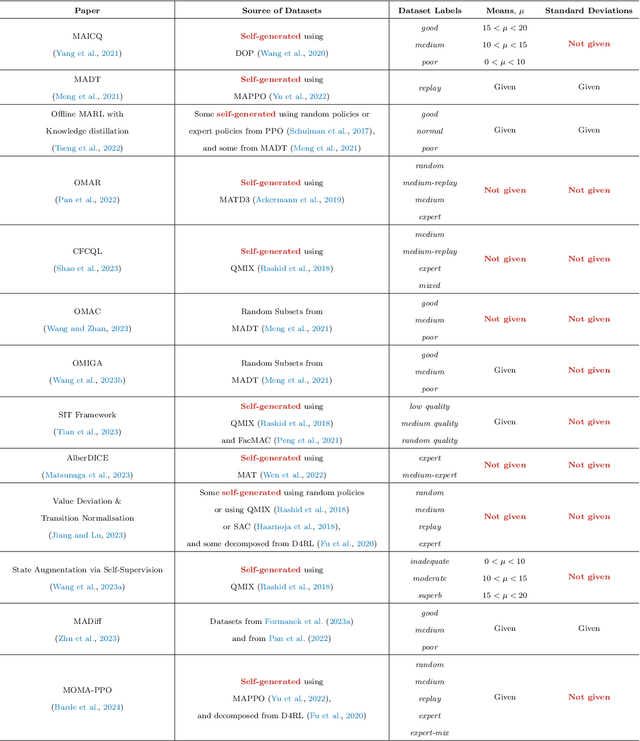

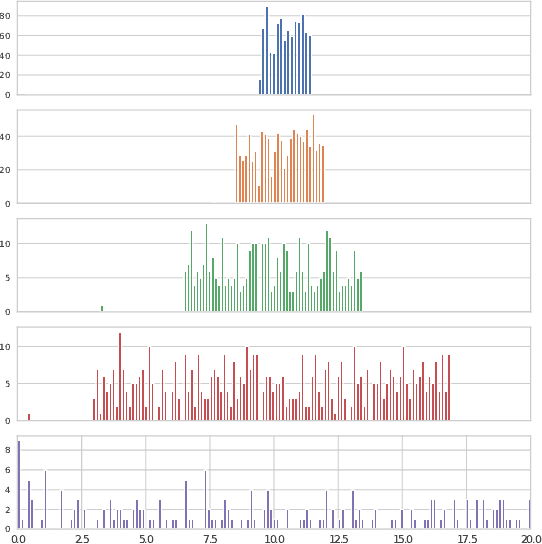

Abstract:Offline multi-agent reinforcement learning (MARL) is an exciting direction of research that uses static datasets to find optimal control policies for multi-agent systems. Though the field is by definition data-driven, efforts have thus far neglected data in their drive to achieve state-of-the-art results. We first substantiate this claim by surveying the literature, showing how the majority of works generate their own datasets without consistent methodology and provide sparse information about the characteristics of these datasets. We then show why neglecting the nature of the data is problematic, through salient examples of how tightly algorithmic performance is coupled to the dataset used, necessitating a common foundation for experiments in the field. In response, we take a big step towards improving data usage and data awareness in offline MARL, with three key contributions: (1) a clear guideline for generating novel datasets; (2) a standardisation of over 80 existing datasets, hosted in a publicly available repository, using a consistent storage format and easy-to-use API; and (3) a suite of analysis tools that allow us to understand these datasets better, aiding further development.
Coordination Failure in Cooperative Offline MARL
Jul 01, 2024
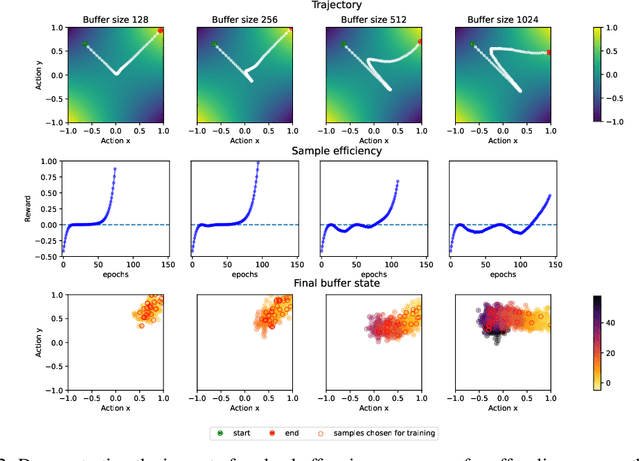

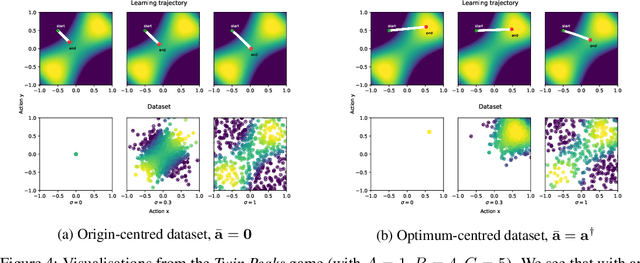
Abstract:Offline multi-agent reinforcement learning (MARL) leverages static datasets of experience to learn optimal multi-agent control. However, learning from static data presents several unique challenges to overcome. In this paper, we focus on coordination failure and investigate the role of joint actions in multi-agent policy gradients with offline data, focusing on a common setting we refer to as the 'Best Response Under Data' (BRUD) approach. By using two-player polynomial games as an analytical tool, we demonstrate a simple yet overlooked failure mode of BRUD-based algorithms, which can lead to catastrophic coordination failure in the offline setting. Building on these insights, we propose an approach to mitigate such failure, by prioritising samples from the dataset based on joint-action similarity during policy learning and demonstrate its effectiveness in detailed experiments. More generally, however, we argue that prioritised dataset sampling is a promising area for innovation in offline MARL that can be combined with other effective approaches such as critic and policy regularisation. Importantly, our work shows how insights drawn from simplified, tractable games can lead to useful, theoretically grounded insights that transfer to more complex contexts. A core dimension of offering is an interactive notebook, from which almost all of our results can be reproduced, in a browser.
Dispelling the Mirage of Progress in Offline MARL through Standardised Baselines and Evaluation
Jun 13, 2024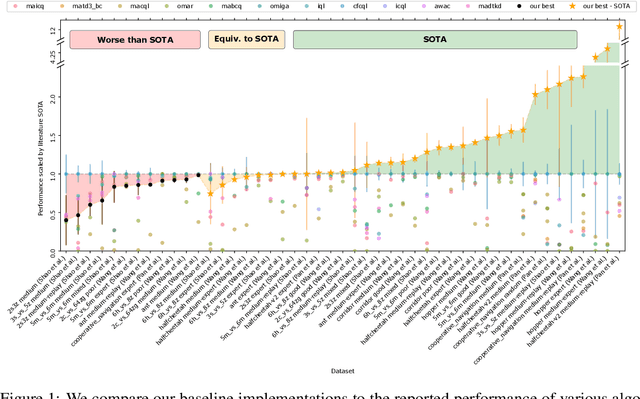



Abstract:Offline multi-agent reinforcement learning (MARL) is an emerging field with great promise for real-world applications. Unfortunately, the current state of research in offline MARL is plagued by inconsistencies in baselines and evaluation protocols, which ultimately makes it difficult to accurately assess progress, trust newly proposed innovations, and allow researchers to easily build upon prior work. In this paper, we firstly identify significant shortcomings in existing methodologies for measuring the performance of novel algorithms through a representative study of published offline MARL work. Secondly, by directly comparing to this prior work, we demonstrate that simple, well-implemented baselines can achieve state-of-the-art (SOTA) results across a wide range of tasks. Specifically, we show that on 35 out of 47 datasets used in prior work (almost 75% of cases), we match or surpass the performance of the current purported SOTA. Strikingly, our baselines often substantially outperform these more sophisticated algorithms. Finally, we correct for the shortcomings highlighted from this prior work by introducing a straightforward standardised methodology for evaluation and by providing our baseline implementations with statistically robust results across several scenarios, useful for comparisons in future work. Our proposal includes simple and sensible steps that are easy to adopt, which in combination with solid baselines and comparative results, could substantially improve the overall rigour of empirical science in offline MARL moving forward.
Generalisable Agents for Neural Network Optimisation
Nov 30, 2023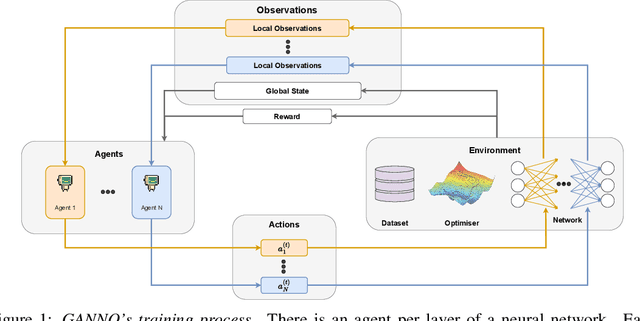



Abstract:Optimising deep neural networks is a challenging task due to complex training dynamics, high computational requirements, and long training times. To address this difficulty, we propose the framework of Generalisable Agents for Neural Network Optimisation (GANNO) -- a multi-agent reinforcement learning (MARL) approach that learns to improve neural network optimisation by dynamically and responsively scheduling hyperparameters during training. GANNO utilises an agent per layer that observes localised network dynamics and accordingly takes actions to adjust these dynamics at a layerwise level to collectively improve global performance. In this paper, we use GANNO to control the layerwise learning rate and show that the framework can yield useful and responsive schedules that are competitive with handcrafted heuristics. Furthermore, GANNO is shown to perform robustly across a wide variety of unseen initial conditions, and can successfully generalise to harder problems than it was trained on. Our work presents an overview of the opportunities that this paradigm offers for training neural networks, along with key challenges that remain to be overcome.
Reduce, Reuse, Recycle: Selective Reincarnation in Multi-Agent Reinforcement Learning
Mar 31, 2023Abstract:'Reincarnation' in reinforcement learning has been proposed as a formalisation of reusing prior computation from past experiments when training an agent in an environment. In this paper, we present a brief foray into the paradigm of reincarnation in the multi-agent (MA) context. We consider the case where only some agents are reincarnated, whereas the others are trained from scratch -- selective reincarnation. In the fully-cooperative MA setting with heterogeneous agents, we demonstrate that selective reincarnation can lead to higher returns than training fully from scratch, and faster convergence than training with full reincarnation. However, the choice of which agents to reincarnate in a heterogeneous system is vitally important to the outcome of the training -- in fact, a poor choice can lead to considerably worse results than the alternatives. We argue that a rich field of work exists here, and we hope that our effort catalyses further energy in bringing the topic of reincarnation to the multi-agent realm.
Revisiting the Gumbel-Softmax in MADDPG
Feb 23, 2023Abstract:MADDPG is an algorithm in multi-agent reinforcement learning (MARL) that extends the popular single-agent method, DDPG, to multi-agent scenarios. Importantly, DDPG is an algorithm designed for continuous action spaces, where the gradient of the state-action value function exists. For this algorithm to work in discrete action spaces, discrete gradient estimation must be performed. For MADDPG, the Gumbel-Softmax (GS) estimator is used -- a reparameterisation which relaxes a discrete distribution into a similar continuous one. This method, however, is statistically biased, and a recent MARL benchmarking paper suggests that this bias makes MADDPG perform poorly in grid-world situations, where the action space is discrete. Fortunately, many alternatives to the GS exist, boasting a wide range of properties. This paper explores several of these alternatives and integrates them into MADDPG for discrete grid-world scenarios. The corresponding impact on various performance metrics is then measured and analysed. It is found that one of the proposed estimators performs significantly better than the original GS in several tasks, achieving up to 55% higher returns, along with faster convergence.
 Add to Chrome
Add to Chrome Add to Firefox
Add to Firefox Add to Edge
Add to Edge